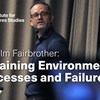foreing

Stefan Svallfors
I am professor in Sociology at the Institute for Futures Studies in Stockholm, and a member of the Royal Swedish Academy of Sciences. My research concerns different forms of expertise and their role in (Edward Elgar 2020).
Malcolm Fairbrother: Explaining Environmental Successes and Failures
Venue:Institutet för framtidsstudier, Holländargatan 13, 4th floor, Stockholm, or online. Research seminar with Malcolm Fairbrother, Professor of Sociology, researcher at the Institute for Futures Stud

Malcolm Fairbrother: Explaining Environmental Successes and Failures
Research seminar with Malcolm Fairbrother, Professor of Sociology, researcher at the Institute for Futures Studies. Abstract Why has the world failed so disastrously on climate change? Humanity has su
Robert Goodin: Structures of Complicity
Structures of Complicity: Consumers, Producers, Suppliers with Professor Robert E. Goodin, Australian National University AbstractUnder certain circumstances, businesses and consumers might be morally
Movie premiere! A New Society
Why do we need social progress? On July of 2014 a monumental task began as hundreds of the world's leading academics came together to set new standards for a just, secure and healthy global society. T has been tirelessly forming a non-partisan report addressed to all social actors, movements, organizations, politicians, and decision-makers in order to provide an architecture for present and future global issues and crises.
Are animals needed for food supply, efficient resource use, and sustainable cropping systems? An argumentation analysis regarding livestock farming
Food Ethics, vol. 9 Abstract It has been argued that livestock farming is necessary to feed a growing population, that it enables efficient use of land and biomass that would otherwise be lost from the
Elite Schools, Elite Ambitions? The Consequences of Secondary-Level School Choice Sorting for Tertiary-Level Educational Choices
in: European Sociological Review, Volume 36, Issue 4 AbstractWe ask if school choice, through its effect on sorting across schools, affects high school graduates’ application decisions to higher educatof higher educational programs applied for. Low achievers increased their propensity to apply for the ‘low-status’ educational programs, on average destining them to less prestigious, less well-paid occupations, and high achievers increased their propensity to apply for ‘high-status’ educational programs, on average destining them to more prestigious, well-paid occupations. The results suggest that increased sorting across schools reinforces differences across schools and groups in ‘cultures of ambition’. Although these effects translate into relatively small increases in the gender gap, the immigration gap, and the parental education gap in educational choice, our results indicate that school choice, and the increased sorting it leads to, through conformity mechanisms in schools polarizes educational choices of students across achievement groups.
Jan Teorell: Commitments and bargaining delays in parliamentary democracies
Research seminar with Jan Teorell, professor of political science at Lund University. Register hereAbstractDuring the past decade, many parliamentary democracies have experienced bargaining delays when

How much crime can foreign background explain? with Amber Beckley
Can the number of people with foreign background living in an area explain the level of crime in that same area? In this talk Amber Beckley gives us the numbers and finds a correlation that points cle








